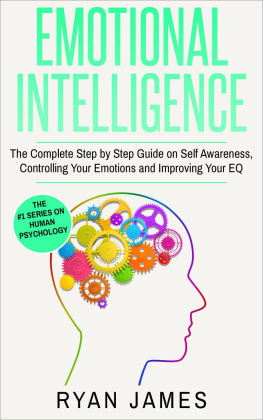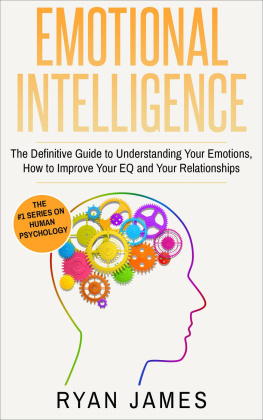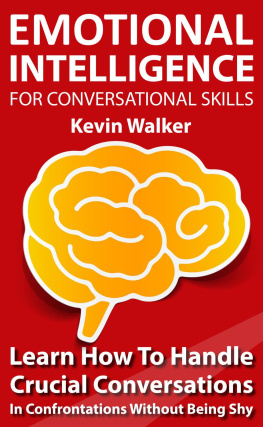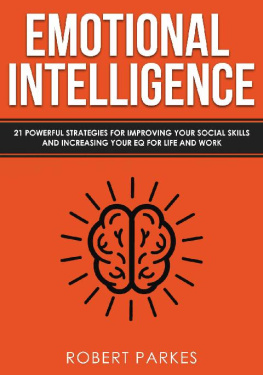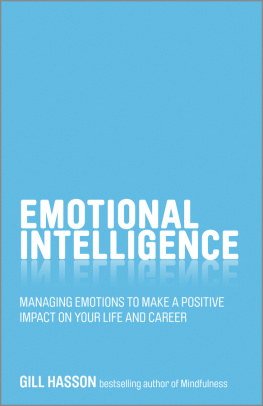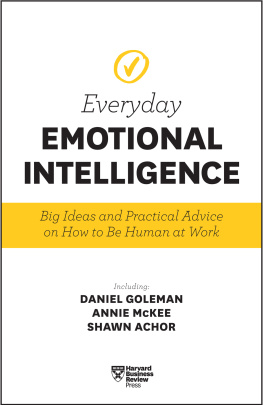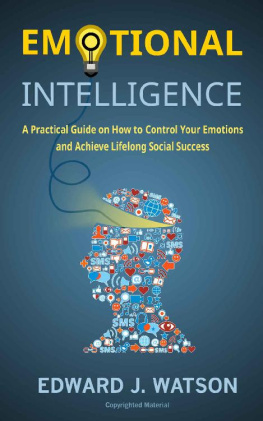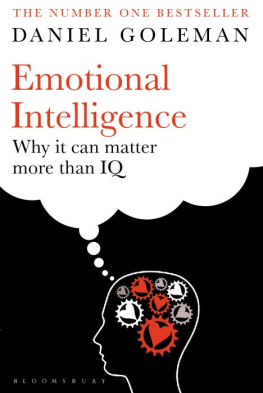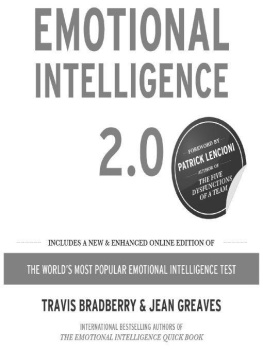Emotional Intelligence
How They Determine Our Success - Increase Your EQ by Mastering Your Emotion s
Dan Miller
Copyright dsk-enterprise Inc Ltd. 2014
All rights reserved. No part of this publication may be reproduced in any form without written consent of the author and the publisher. The information contained in this book may not be stored in a retrieval system, or transmitted in any form by any means, electronic, mechanical, photocopying or otherwise without the written permission of the publisher. This book may not be resold, hired out or otherwise disposed by way of trade in any form of binding or cover other than that in which it is published, without the written consent of the publisher.
Legal Disclaimer
The information contained in this book is strictly for educational purpose only. The content of this book is the sole expression and opinion of its author and not necessarily that of the publisher. It is not intended to cure, treat, and diagnose any kind of disease or medical condition. It is sold with the understanding that the publisher is not rendering any type of medical, psychological, legal, or any other kind of professional advice. You should seek the services of a competent professional before applying concepts in this book. Neither the publisher nor the individual author(s) shall be liable for any physical, psychological, emotional, financial, or commercial damages, directly or indirectly by the use of this material, which is provided as is, and without warranties. Therefore, if you wish to apply ideas contained in this book, you are taking full responsibility for your actions.
Table of Contents
1: What Is Emotional Intelligence
2: Benefits of Emotional Intelligence
3: How to Identify and Deal with Emotional Triggers
4: Taking Responsibility and Setting Personal Boundaries
5: The Importance of Meditation in Enhancing Emotional Intelligence
6: How to Raise Your Emotional Intelligence
7: Keys to Commanding Your Emotions
8: Emotional Control and Anger Management
9: Emotional Intelligence and Conflict Resolution
10: Mastering Interpersonal Skills for Emotional Intelligence
11: How to Improve Your Emotional Health
Conclusion
Important Insight
Everyone is confronted by our own emotions in addition to those of other people. The manner in which we manage these emotions will determine how other people perceive us and our effectiveness in getting things done. By increasing our emotional intelligence, we will be better equipped to respond to situations around us with a high degree of maturity.
Studies by renowned researchers such as John Mayer, Peter Salovey and Konstantin Vasily Petrides have shown that people who have a high emotional intelligence become better leaders and are exemplary in whatever they do.
In his doctoral thesis entitled - A study of Emotion: Developing Emotional Intelligence , Wayne Payne became the first person to use the term emotional intelligence. Compared to intelligence quotient (IQ), emotional intelligence appears to be superior because it covers a wide range of faculties and aspects of peoples behavior.
Studying emotional intelligence will help you understand the source and impact of your emotions. This is important because it enhances self awareness. You will also have an opportunity to understand the behavior of other people and the underlying reasons why they act the way they do.
Conflict management borrows heavily from emotional intelligence. By understanding the emotional needs of other people, you will be better placed to handle conflicts and resolve them in a manner that benefits every party. When conflicts are resolved amicably, they give you an opportunity to establish even stronger relationships and social bonds. A mastery of interpersonal skills such as listening, verbal communication, non-verbal communication, self management and assertiveness will make you gain trust and respect from others thereby becoming an influential person in social circles.
1: What Is Emotional Intelligence?
Emotional intelligence refers to the ability to identify, understand, use and manage emotions in a positive manner so as to enhance communication, relieve stress, overcome challenges, empathize with others and defuse conflict. The scope of emotional intelligence is wide and covers many different aspects of our daily lives such as the way in which we behave and interact with others.
An emotional intelligent person is able to recognize his own emotional state as well as the emotional states of other people. This makes him attractive and draws other people towards him. Having a clear understanding of the emotional states of the people you interact with will help you to relate well with them, achieve greater success at the workplace, form healthier relationships and lead a more satisfying life.
Compared to intelligence quotient (IQ), emotional intelligence is considered more important in attaining happiness and success in life and career. Our ability to read and interpret other peoples signals and respond appropriately to them determines how far we can go in our individual and professional pursuit of success.
It is therefore important that every one of us develop a mature emotional intelligence framework that will help us to understand, negotiate and empathize with others. This is particularly important because the world is becoming increasingly interconnected and as such we are constantly exposed to cultural shocks from different parts of the globe.
Categories of Emotional Intelligence
Researchers in the area of emotional intelligence recognize the existence of five major classes of emotional intelligence skills.
Self-Awareness
Self-awareness is the ability to recognize your emotions and the impact they have on your thoughts and behavior. Through self-awareness, you will be able to understand your strengths and weaknesses. This is acritical component of your emotional intelligence complex and it helps you in building self-confidence.
Self-Regulation
The ability to put impulsive behaviors and feelings under control is another crucial part of emotional intelligence. While self-management does not necessarily prevent the occurrence of an emotion, it enables us to have a say in how long an emotion lasts. Learning how to manage emotions in a healthy way, adapting to changing circumstances and following through on commitments are some of the key aspects of self-regulation.
There are a number of techniques that you can use to ward off negative emotions such as anxiety, anger or depression. Some of these techniques include meditation and recasting situations in a positive light. Self-regulation involves the following attributes:
Self-control
This trains you on how to manage disruptive impulses.
Trustworthiness
This attribute of self-regulation enables you to maintain standards of integrity and honesty.
Conscientiousness
This refers to your ability to take responsibility for your own actions.
Adaptability
This component gives you flexibility in the face of changing circumstances.
Innovation
This a progressive attribute of self-regulation that opens you up to new ideas.
Motivation
Motivation refers to an internal process that propels you toward a goal. This category of emotional intelligence requires that you set clear goals, have a definite pathway and a positive attitude. Every one of us has a predisposition towards a negative or positive attitude but with motivation, we can shift how we think to a more positive orientation.
Every negative thought that may cross your mind at one point or another can be reframed in positive terms in order to help you achieve your goals. Motivation consists of:
Achievement Drive
This refers to a constant strive aimed at meeting a standard of excellence.
Next page








